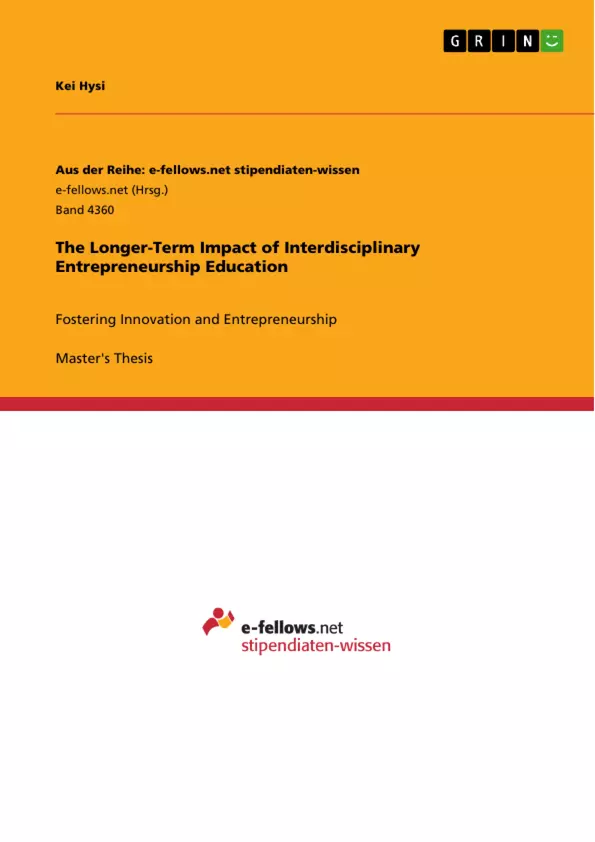This thesis addresses the longer-term impact of interdisciplinary entrepreneurship education on alumni’s career paths regarding entrepreneurial and innovative outcomes. A survey was deployed to the alumni of the Center for Digital Technology and Management’s interdisciplinary entrepreneurship program in Munich, employing a mixed-method research approach. This research draws on the Social Cognitive Career Theory as its theoretical framework, primarily focusing on the self-efficacy construct. The findings of this thesis shed light on the career trajectories of the CDTM alumni. Additionally, the research compares the self-efficacies and work behaviors in relation to innovation and entrepreneurship of two distinct groups: founder and non-founder alumni. Lastly, three elements of entrepreneurship education were identified as having the most significant impact on alumni’s careers and the promotion of entrepreneurship and innovation. Hence, this thesis contributes to the existing body of knowledge by expanding the understanding of entrepreneurship education’s influence on fostering innovation and entrepreneurship. The study identifies key factors contributing to the success of such entrepreneurship education, offering suggestions that can be incorporated into existing and future entrepreneurship education programs designed for interdisciplinary individuals. This work serves as a foundational resource for enhancing future entrepreneurship programs, ultimately contributing to economic growth and societal development.
Inhaltsverzeichnis (Table of Contents)
- 1. Introduction
- 1.1 Relevance and Research Gap
- 1.2 Structure of the Thesis
- 2. Theoretical Context
- 2.1 Innovation and Entrepreneurship
- 2.1.1 Individual Innovative and Entrepreneurial Behavior
- 2.2 Social Cognitive Career Theory
- 2.3 Innovation and Entrepreneurial Self-Efficacies
- 2.4 The Role of Entrepreneurship Education in Fostering Students' ISE and ESE
- 3. Research Study Context
- 3.1 Innovation and Entrepreneurship at Stanford
- 3.2 Innovation and Entrepreneurship in Munich
- 3.3 Center for Digital Technology and Management
- 4. Research Design and Methodology
- 4.1 Survey Instrument Design
- 4.2 Data Collection
- 4.3 Data Cleaning Process
- 4.4 Analysis
- 4.4.1 Quantitative Analysis
- 4.4.2 Qualitative Analysis
- 5. Results
- 5.1 Descriptive Statistics
- 5.2 Answering RQ1
- 5.2.1 Post-CDTM Job Descriptive Analysis
- 5.2.2 Current or Most Recent Job Descriptive Analyses
- 5.3 Answering RQ2
Zielsetzung und Themenschwerpunkte (Objectives and Key Themes)
This thesis aims to analyze the longer-term impact of interdisciplinary entrepreneurship education on alumni's career paths, specifically focusing on entrepreneurial and innovative outcomes. The research uses a mixed-method approach to understand the career trajectories of alumni from the Center for Digital Technology and Management's program in Munich. It draws on the Social Cognitive Career Theory framework, focusing on the self-efficacy construct.
- Long-term impact of interdisciplinary entrepreneurship education on alumni careers
- Entrepreneurial and innovative outcomes in alumni's careers
- Comparison of self-efficacies and work behaviors between founder and non-founder alumni
- Identification of key elements in entrepreneurship education that contribute to successful career paths
- Insights into the influence of entrepreneurship education on fostering innovation and entrepreneurship
Zusammenfassung der Kapitel (Chapter Summaries)
Chapter 1 introduces the topic of the thesis, outlining its relevance and research gap. Chapter 2 provides a theoretical context for the research, discussing innovation and entrepreneurship, the Social Cognitive Career Theory, and the role of entrepreneurship education in fostering self-efficacy.
Chapter 3 explores the research study context, focusing on innovation and entrepreneurship at Stanford and in Munich, as well as the Center for Digital Technology and Management. Chapter 4 details the research design and methodology, including survey instrument design, data collection, cleaning, and analysis.
Chapter 5 presents the results of the research, covering descriptive statistics and analyses related to the research questions. The chapter focuses on post-CDTM and current job descriptions, as well as comparing the self-efficacy and work behaviors of founder and non-founder alumni.
Schlüsselwörter (Keywords)
This thesis primarily focuses on the intersection of innovation, entrepreneurship, and education. It investigates the impact of interdisciplinary entrepreneurship education on fostering innovation and entrepreneurship in alumni careers. Central to the analysis is the concept of self-efficacy within the Social Cognitive Career Theory framework. The study aims to understand the career trajectories of alumni, comparing the self-efficacies and work behaviors of founder and non-founder alumni. Additionally, it identifies key elements in entrepreneurship education that contribute to successful career paths and promote innovation and entrepreneurship.
- Citar trabajo
- Kei Hysi (Autor), 2023, The Longer-Term Impact of Interdisciplinary Entrepreneurship Education, Múnich, GRIN Verlag, https://www.grin.com/document/1450626



